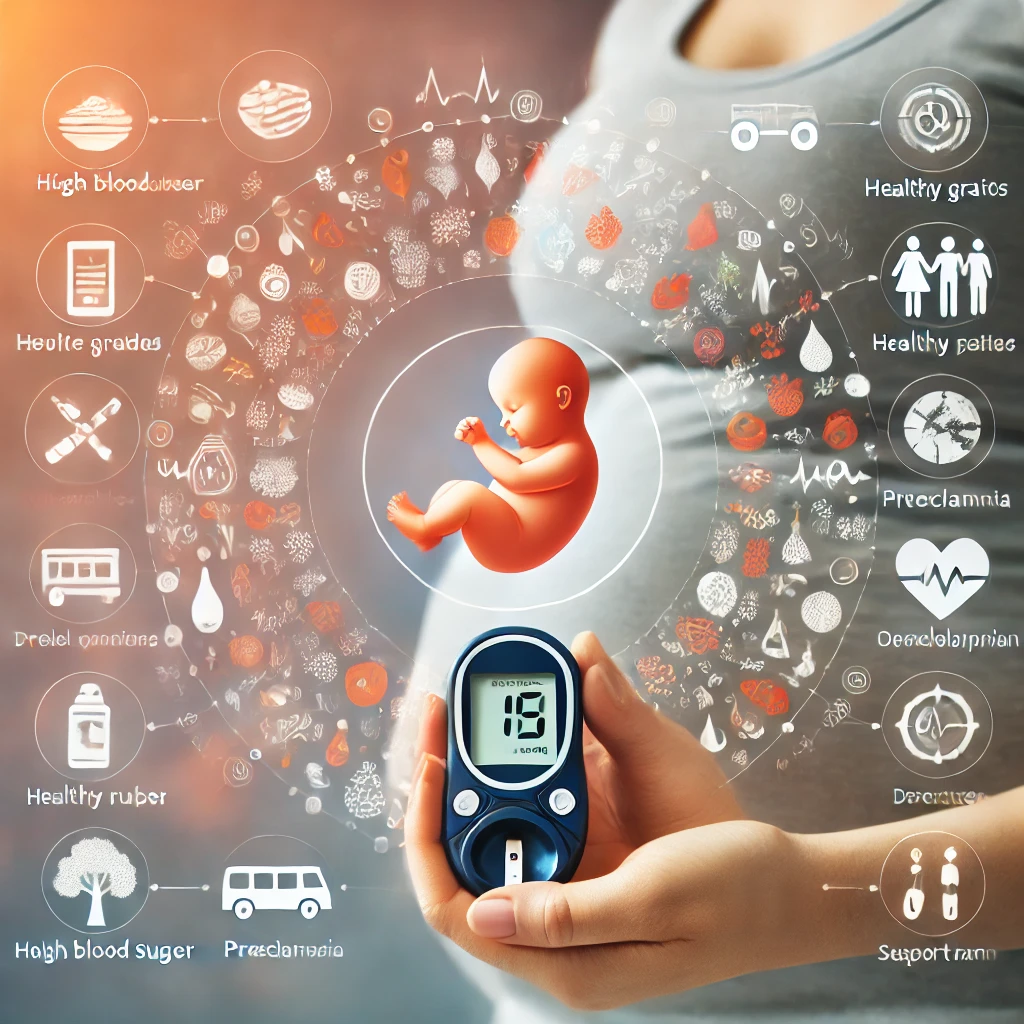
In recognition of World Diabetes Day 2024, we shed light on Gestational Diabetes—a unique and often under-discussed form of diabetes that occurs during pregnancy.
Affecting millions of women worldwide, gestational diabetes poses health risks not only for mothers but also for their babies, both during pregnancy and beyond. Awareness, proactive management, and support for mothers are crucial for minimizing these risks and ensuring healthy outcomes.
Gestational diabetes mellitus (GDM) develops during pregnancy when a woman’s body becomes unable to produce enough insulin to regulate blood sugar levels effectively. Unlike other types of diabetes, GDM is usually temporary and resolves after childbirth. However, it can increase the risk of developing Type 2 diabetes later in life for both the mother and child.
Also Read: Mayor Adams unveils innovation in policing, launches drone program to boost public safety
While it can affect any pregnant woman, certain factors increase the risk, including a family history of diabetes, obesity, older maternal age, and previously delivering a large baby. Since symptoms of gestational diabetes are often subtle or absent, the condition is usually identified through routine blood sugar testing during pregnancy.
Gestational diabetes carries a range of health implications for both the mother and the baby.
Risks for the Mother
Women with gestational diabetes are at increased risk for several pregnancy complications, including:
Preeclampsia: Characterized by high blood pressure, preeclampsia can be life-threatening if left untreated.
Higher likelihood of cesarean delivery: Large babies (a common outcome of untreated GDM) can lead to more complicated labor, often resulting in a cesarean delivery.
Increased risk of developing Type 2 diabetes: Mothers with GDM have a higher risk of developing Type 2 diabetes later in life, making it essential for ongoing screening and lifestyle adjustments after pregnancy.
Risks for the Baby
The baby is also vulnerable to various health risks, both during pregnancy and after birth, including:
Macrosomia: High maternal blood sugar can lead to excessive fetal growth, increasing the risk of injuries during birth.
Hypoglycemia: Babies born to mothers with GDM can experience low blood sugar levels shortly after birth, sometimes requiring immediate intervention.
Respiratory issues: Infants of mothers with gestational diabetes are more prone to breathing difficulties, particularly if they are born prematurely.
Increased risk of Type 2 diabetes and obesity: Studies show that children born to mothers with GDM have a higher risk of obesity and Type 2 diabetes later in life.
Managing Gestational Diabetes
The key to reducing the risks associated with gestational diabetes is effective management. Early diagnosis, regular monitoring, and appropriate lifestyle adjustments can have a profound impact on outcomes for both mother and baby.
Dietary Adjustments
Diet plays a central role in managing GDM. Health experts recommend a balanced diet that stabilizes blood sugar levels, which includes:
Complex carbohydrates: Whole grains, vegetables, and legumes are beneficial in maintaining a steady blood sugar level.
Healthy fats: Foods like avocados, nuts, and seeds support maternal health without causing blood sugar spikes.
Protein-rich foods: Lean meats, poultry, fish, and tofu are essential for both mother and baby’s growth and development.
Small, frequent meals that balance carbohydrates with protein can help manage blood sugar more effectively than larger, carbohydrate-heavy meals.
Regular Physical Activity
Exercise is another essential component of managing gestational diabetes. Regular, moderate exercise like walking or swimming helps the body use glucose more effectively, lowers blood sugar levels, and reduces insulin resistance. Importantly, any exercise regimen should be tailored to the mother’s health condition and approved by a healthcare provider to ensure it is safe.
Monitoring Blood Sugar
Women with gestational diabetes need to monitor their blood sugar levels consistently. By keeping track of these levels throughout the day, they can make necessary adjustments to diet or insulin intake, if required.
Medication and Insulin Therapy
In some cases, lifestyle changes may not be enough to control blood sugar levels, and medication or insulin injections may be necessary. Insulin therapy is often recommended when blood glucose levels remain elevated despite dietary and exercise interventions.
Lifelong Implications and Preventive Measures
Gestational diabetes may be temporary, but its implications can last a lifetime. The increased risk of developing Type 2 diabetes for both mother and child highlights the importance of preventive care even after pregnancy.
Postpartum Monitoring and Education
After delivery, mothers who had gestational diabetes should undergo periodic screenings for Type 2 diabetes. Many women are unaware of the long-term risks posed by GDM, so healthcare providers must educate new mothers on how to manage these risks, including adopting healthy lifestyle practices that can prevent or delay the onset of Type 2 diabetes.
Preventive Measures for the Baby
Children born to mothers with gestational diabetes are more likely to develop obesity and Type 2 diabetes later in life. Parents can help mitigate this risk by instilling healthy habits early, such as balanced diets and regular physical activity, setting their children on a path toward lifelong health.
Community and Healthcare Support
Support for mothers dealing with gestational diabetes should extend beyond the clinic. Community health programs, support groups, and digital health apps can provide guidance and encouragement, helping mothers manage GDM effectively and reducing its impact on their lives. World Diabetes Day is an opportunity for health organizations, governments, and communities to amplify their efforts in educating women and healthcare professionals about gestational diabetes.
A Call for Awareness and Action
Gestational diabetes may be temporary, but its impact is enduring. By raising awareness of the risks, management strategies, and implications of GDM, we can empower mothers to make informed health choices. This World Diabetes Day, let us recognize the importance of maternal health in the fight against diabetes and work together to support mothers and babies in achieving healthier futures.
Diabetes is a chronic condition that affects how the body processes blood sugar (glucose), which is essential for energy. There are two main types: Type 1 diabetes, an autoimmune disease where the body doesn’t produce insulin, usually diagnosed in children or young adults; and Type 2 diabetes, where the body becomes resistant to insulin or doesn’t make enough, often linked to lifestyle factors and more common in adults.
Symptoms can include frequent urination, excessive thirst, fatigue, and blurred vision. Managing diabetes involves monitoring blood sugar, a balanced diet, exercise, and in some cases, insulin or medication. Without proper control, diabetes can lead to serious health complications such as heart disease, kidney failure, nerve damage, and vision loss.










